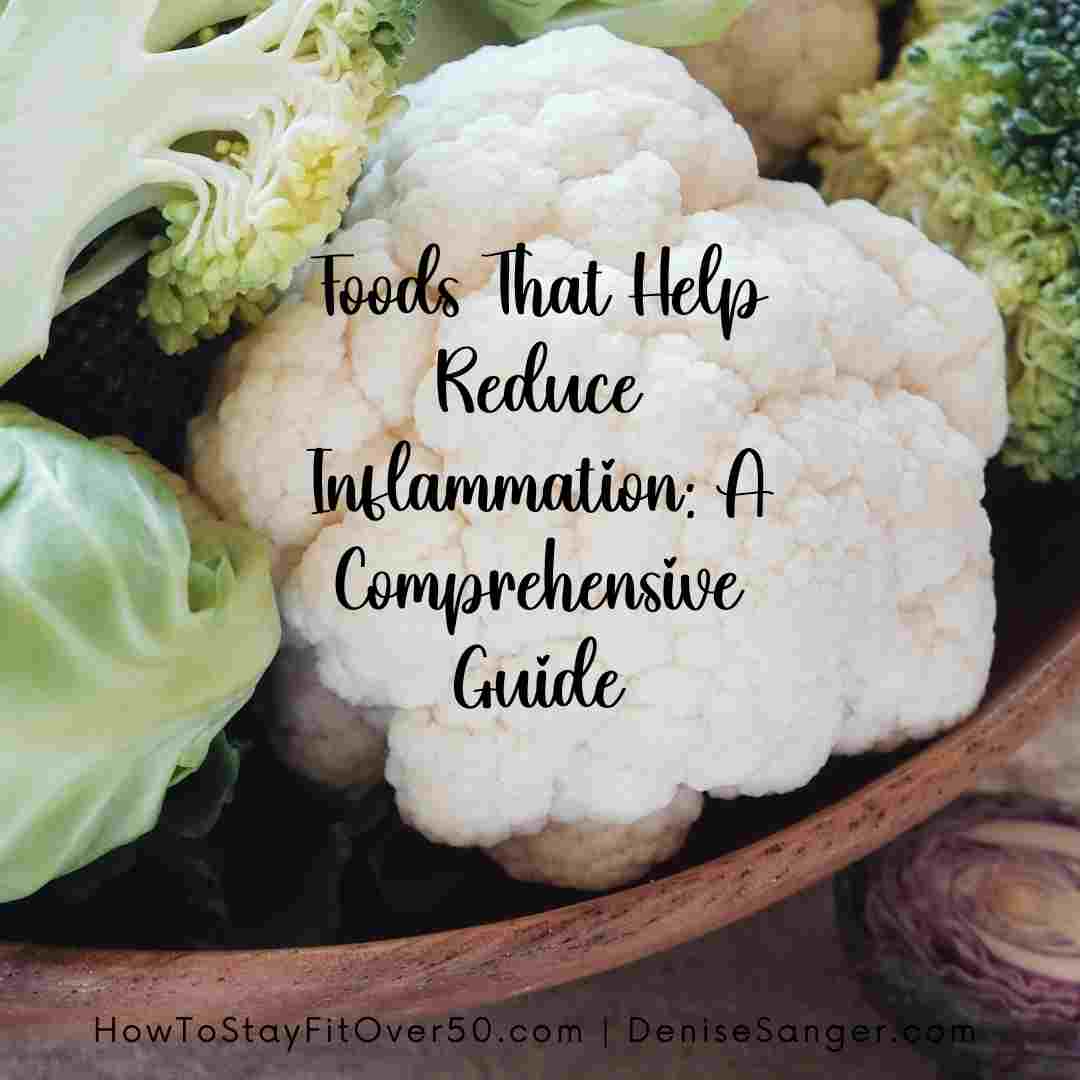We may earn money or products from the companies mentioned in this post.
Are you struggling with chronic inflammation? If so, you’re not alone. Fortunately, there are many foods that can help reduce inflammation and improve your overall health.
First what is inflammation? Inflammation is a natural response of the immune system to injury or infection. However, when inflammation becomes chronic, it can lead to a range of health problems, including heart disease, arthritis, and even cancer.
One of the best ways to fight inflammation is to eat a diet rich in anti-inflammatory foods. These foods can help reduce inflammation by providing your body with the nutrients it needs to heal and repair itself.
Some of the best anti-inflammatory foods include fatty fish, leafy greens, nuts and seeds, and berries. By incorporating these foods into your diet, you can help reduce inflammation and improve your overall health.
How Do I Know I Have Inflammation?
If you are experiencing inflammation, you may not even realize it. Inflammation can be acute, meaning it comes on suddenly and is often accompanied by pain, redness, and swelling. Alternatively, inflammation can be chronic, which means it is ongoing and can be more difficult to detect.
What Are the Symptoms?
Here are some common symptoms of inflammation:
- Pain: Inflammation can cause pain in the affected area. This pain can be mild or severe and can be accompanied by stiffness or tenderness.
- Redness: Inflammation can cause redness in the affected area. This can be due to increased blood flow to the area.
- Swelling: Inflammation can cause swelling in the affected area. This can be due to the accumulation of fluid.
- Heat: Inflammation can cause the affected area to feel warm to the touch. This can be due to increased blood flow to the area.
- Loss of function: Inflammation can cause a loss of function in the affected area. This can be due to pain or swelling.
If you are experiencing any of these symptoms, it is important to speak with your healthcare provider. They can help determine the cause of your symptoms and recommend appropriate treatment.
What Causes Inflammation in the Body?
Inflammation is a natural response of the immune system to injury or infection. It is a protective response that helps the body to heal and fight off harmful invaders. However, when inflammation becomes chronic, it can lead to a range of health problems, including arthritis, heart disease, and cancer.
There are several factors that can contribute to chronic inflammation in the body. These include:
- Poor Diet: A diet high in processed foods, sugar, and saturated fats can lead to chronic inflammation. These foods can trigger the release of inflammatory chemicals in the body, leading to a state of chronic inflammation.
- Stress: Chronic stress can also contribute to chronic inflammation. When you are under stress, your body releases stress hormones that can trigger inflammation.
- Lack of Exercise: A sedentary lifestyle can contribute to chronic inflammation. Exercise has been shown to reduce inflammation in the body.
- Environmental Toxins: Exposure to environmental toxins such as pollution, pesticides, and chemicals can also contribute to chronic inflammation.
- Chronic Infections: Chronic infections such as gum disease, hepatitis, and Lyme disease can also lead to chronic inflammation.
It is important to address these factors in order to reduce chronic inflammation in the body. A diet rich in anti-inflammatory foods, regular exercise, stress management, and avoiding environmental toxins can all help to reduce chronic inflammation and improve overall health.
Do Certain Foods Increase Inflammation?
When it comes to inflammation, certain foods can either help reduce it or increase it. Inflammation is a natural response of your immune system to injury or infection. However, chronic inflammation can lead to a variety of health problems, including heart disease, cancer, and arthritis.
What Foods Cause Inflammation?
Certain foods have been shown to increase inflammation in the body. These include:
- Processed Foods: Processed foods are often high in refined carbohydrates, added sugars, and unhealthy fats. These foods can trigger inflammation in the body and increase the risk of chronic diseases.
- Fried Foods: Fried foods are high in unhealthy fats and can trigger inflammation in the body. They can also increase the risk of heart disease, diabetes, and other chronic conditions.
- Sugary Drinks: Sugary drinks are high in added sugars and can cause inflammation in the body. They can also increase the risk of obesity, type 2 diabetes, and other health problems.
- Red Meat: Red meat is high in saturated fat and can trigger inflammation in the body. It has also been linked to an increased risk of heart disease, cancer, and other chronic conditions.
- Alcohol: Alcohol can trigger inflammation in the body and increase the risk of chronic diseases. It can also weaken the immune system and make it harder for your body to fight off infections.
Are There Foods I Can Eat to Reduce Inflammation?
If you’re looking to reduce inflammation in your body, one of the easiest and most effective ways is through your diet. Here are some foods that can help:
What Should I Drink?
First and foremost, it’s important to stay hydrated. Drinking plenty of water can help flush toxins out of your body and reduce inflammation. In addition to water, there are a few other drinks that can help reduce inflammation:
- Green tea: This tea is packed with antioxidants that can help reduce inflammation and protect your cells from damage.
- Ginger tea: Ginger has anti-inflammatory properties and can help reduce pain and swelling.
- Tart cherry juice: Tart cherries are high in antioxidants and have been shown to reduce inflammation and muscle pain.
In addition to these drinks, it’s important to avoid sugary drinks and alcohol, as they can actually increase inflammation in your body.
What Should I Eat?
In general, a diet rich in fruits, vegetables, whole grains, and lean protein can help reduce inflammation. Here are some specific foods to include in your diet:
- Fatty fish: Salmon, tuna, and other fatty fish are high in omega-3 fatty acids, which have anti-inflammatory properties.
- Berries: Blueberries, strawberries, and other berries are high in antioxidants that can help reduce inflammation.
- Leafy greens: Spinach, kale, and other leafy greens are packed with nutrients that can help reduce inflammation.
- Nuts and seeds: Almonds, walnuts, and chia seeds are high in healthy fats and can help reduce inflammation.
It’s also important to avoid processed foods, fried foods, and foods high in sugar and saturated fat, as these can increase inflammation in your body.
By incorporating these foods into your diet and avoiding inflammatory foods, you can help reduce inflammation and improve your overall health.
Tips to Reduce Inflammation in Your Body
Inflammation is a natural response of the immune system to injury or infection. However, chronic inflammation can lead to several health problems, including heart disease, arthritis, and cancer. Here are some tips to reduce inflammation in your body:
1. Eat a Healthy Diet
The food you eat can either promote or reduce inflammation in your body. A healthy diet rich in fruits, vegetables, whole grains, lean protein, and healthy fats can help reduce inflammation. Some of the best anti-inflammatory foods include:
- Berries (such as blueberries, strawberries, and raspberries)
- Leafy green vegetables (such as spinach, kale, and collard greens)
- Fatty fish (such as salmon, tuna, and sardines)
- Nuts and seeds (such as almonds, walnuts, and chia seeds)
- Olive oil
- Turmeric
2. Avoid Processed Foods
Processed foods are often high in refined carbohydrates, sugar, and unhealthy fats, which can promote inflammation in your body. Avoid processed foods such as:
- Sugary drinks (such as soda and fruit juice)
- Processed meats (such as bacon and sausage)
- White bread and pasta
- Snack foods (such as chips and crackers)
3. Exercise Regularly
Regular exercise can help reduce inflammation in your body by improving circulation and reducing stress. Aim for at least 30 minutes of moderate exercise most days of the week. Some good options include:
- Walking
- Jogging
- Swimming
- Cycling
- Yoga
4. Manage Stress
Chronic stress can lead to inflammation in your body. Find ways to manage stress, such as:
- Meditation
- Deep breathing
- Yoga
- Massage
- Spending time in nature
5. Get Enough Sleep
Lack of sleep can also lead to inflammation in your body. Aim for 7-8 hours of sleep each night. Some tips to improve sleep include:
- Establish a regular sleep schedule
- Avoid caffeine and alcohol before bedtime
- Keep your bedroom cool and dark
- Avoid screens (such as phones and TVs) before bedtime
By following these tips, you can help reduce inflammation in your body and improve your overall health.
Yoga for Inflammation
If you’re looking for a natural way to help reduce inflammation in your body, yoga may be worth considering. Here are a few ways that practicing yoga can help with inflammation:
- Stress reduction: One of the main benefits of yoga is its ability to reduce stress. When you’re stressed, your body produces cortisol, a hormone that can contribute to inflammation. By reducing stress levels, yoga may help lower inflammation in the body.
- Improved circulation: Yoga poses and breathing exercises can help improve blood flow and circulation. This can be beneficial for reducing inflammation, as better circulation means that nutrients and oxygen can be delivered more efficiently throughout the body.
- Increased flexibility: Regular yoga practice can help improve flexibility and range of motion in the body. This can be especially helpful for people with inflammatory conditions such as arthritis, as it can help reduce stiffness and improve joint function.
- Breathing exercises: Many yoga practices include breathing exercises, such as pranayama. These exercises can help calm the mind and reduce stress, but they may also have a direct effect on inflammation. Some studies have shown that deep breathing exercises can help reduce inflammation in the body.
- Mindfulness: Yoga is often practiced with a focus on mindfulness and awareness. This can help you become more in tune with your body and its needs, which can be helpful for managing inflammation. By paying attention to how your body feels and responding appropriately, you may be able to reduce inflammation and other symptoms.
Overall, practicing yoga can be a helpful tool for managing inflammation. Whether you’re dealing with a chronic condition or just looking to improve your overall health, incorporating yoga into your routine may be worth considering.
Here are links to other helpful information:











